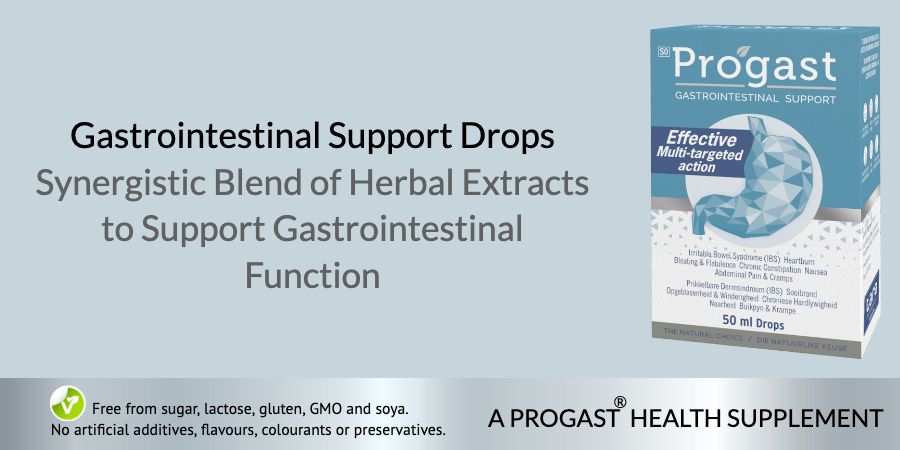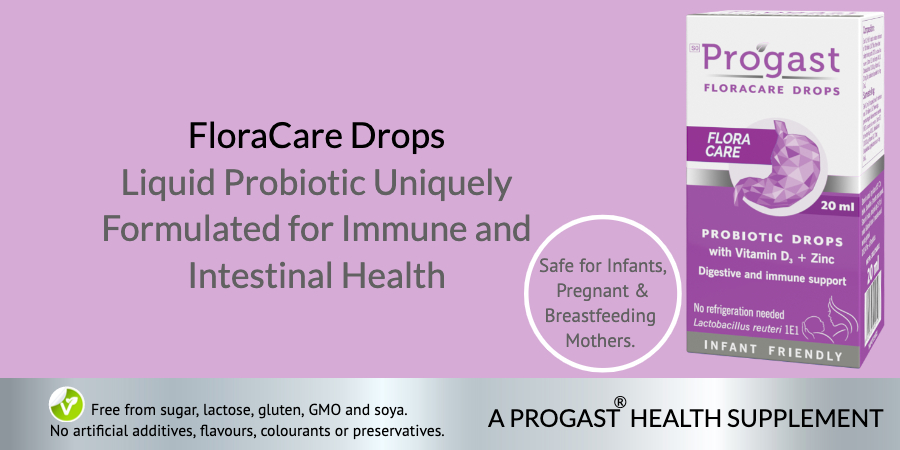Progast® FloraCare Forte Capsules
Progast® FloraCare Forte Capsules is more than just another probiotic. It’s a multi-strain probiotic formulation containing prebiotic fibre, botanical extracts, minerals and vitamin D3. FloraCare is encapsulated in novel DRCaps® for maximum freshness and targeted release throughout the gastrointestinal tract.
For optimal gut health and overall health, we need more than just probiotics. There is a synergistic effect when prebiotic β-Glucan, vitamin D3, minerals, gingerol and artichoke leaf extract are added to FloraCare’s 4-strain probiotics. Synergy is the behaviour of whole systems unpredicted by the behaviour of their parts.
Artichoke (Cynara scolymus) is an antioxidant rich thistle known to improve digestive and bowel problems such as IBS, heartburn, cramping, bloating, gas and constipation. In animal studies, liquid extracts of the roots and leaves of artichoke have demonstrated an ability to protect the liver, with possibly even to help liver cells regenerate.
Ginger, botanically known as Zingiber officinale, is a most phenomenal herb and healing entity that is beyond the scope of any modern drug. And we don’t say that likely! It has been used in Oriental formulations for thousands of years. Our product does not contain dried ginger, but gingerol – an isolated oily-resinous substance, comprising 5% of the plant.
Ginger is one of nature’s richest sources of the proteolytic enzyme zingibain, an enzyme that digests protein. Perilla leaf extract regulates the enzymes of lipoprotein metabolism and together, gingerol and perilla leaf extract synergistically play a role in influencing lipid metabolism.
One gram of zingibain can tenderize as much as 9 kg of meat! We know how difficult it is to digest protein, so imagine the impact on digestion of 150 mg of ginger extract in every FloraCare Capsule. Ginger promotes contractions, further assisting the transit time of food through the digestive tract. Food sitting in the stomach for too long is often thought to be the cause of indigestion.
Beside improving digestion, zingibain contributes to the antibacterial and anti-inflammatory action of FloraCare. Studies have shown that enzymes like zingibain can enhance the effectiveness of probiotics. Both probiotics and digestive enzymes are vital to our digestive health and perform complementary functions.
Our formula further contains
- anti-inflammatory vitamin D3
- folic acid to further assist the body in digesting protein by stimulating the formation of digestive acids
- zinc gluconate – an essential mineral and nutrient in the gut barrier function and
- selenium, as deficiency increases inflammation and oxidative stress that can actually contribute to gut permeability.
Probiotic-containing products have long been studied and appreciated for their positive effect on gastrointestinal health. The effects of a healthy microbiome reach far more widely than just your gut. Your gut flora affects much more than your digestive health – it affects the health of your entire body, including your brain. The benefits of supplementing with a high-quality probiotic are abundant.
FloraCare can be helpful for those struggling with uncomfortable symptoms such as acid reflux, constipation, nausea, diarrhoea, indigestion and food sensitivities, IBS, gas, bloating and other complications.
Our ingredients have a synergistic effect. See our ingredients page for more on the actives and their mechanism of action.
Ingredients:
| Four probiotic strains: Lactobacillus acidophilus, Bifidobacterium longum, Bifidobacterium bifidum, Bifidobacterium lactis |
1 billion CFUs |
| Beta 1,3 Glucan (β-1,3-Glucan) | 50 mg |
| Ginger (Zingiber officinale) | 150 mg |
| Artichoke Leaf Extract | 100 mg |
| Foloic Acid | 250 μg |
| Zinc Gluconate | 35 mg |
| Selenium (AAC 0,2 %) | 10 mg |
| Manganese (AAC 10 %) | 10 mg |
| Vitamin D3 | 500 IU (equivalent to 12.5 mcg) |
The importance of the gut-brain axis
Is the secret to improving your mental health in your gut microbiome?
Between 1 000 and 1 150 species of bacteria are able to live in the human gut, containing more that 3 million genes (150 times more than human genes). The bacterial genes interact with our human genes to switch them on or silence them! This is why it is so essential to cultivate a healthy microbiome.
Bidirectional interactions between the brain and your gut flora, might have an important role in modulating the function of the gut.6 Signalling to the brain, the microbiota regulates metabolism, inflammation, hormonal and immunological levels, central and enteric nervous system and many don’t realize it, even your mood and behaviour.
Clinical evidence is mounting to support the role of probiotics to reduce anxiety and stress as well as improving mood.7 Research suggests that pathogenic and non-pathogenic gut bacteria might influence mood-related symptoms.8 Probiotic administration influences the availability of tryptophan, the serotonin precursor, and has a reduction effect on pro-inflammatory immune responses. There is encouraging evidence in support of the proposition that the probiotic Bifidobacteria, may possess antidepressant properties.9

Stress can cause permeable gut lining, enabling bacteria and toxins to enter the blood stream, causing an immune response that further affect the composition of the gut flora.10 Additional evidence of the importance of this gut-brain axis lies in the very high correlation between stress‐related psychiatric symptoms such as anxiety with gastrointestinal disorders including irritable bowel syndrome (IBS) and inflammatory bowel disorder (IBD).11
Emerging evidence suggests that the intestinal microbiota is a source of sleep-promoting signals and sleep-generating mechanisms in the brain.12
Growing evidence suggests cooperation between the gut flora and nuclear receptors.13 A decrease in the desirable gastrointestinal bacteria will lead to deterioration in gastrointestinal, neuro-endocrine or immune relationships and ultimately disease. Enter Progast® FloraCare Forte Capsules.
DRCaps®
Progast® FloraCare Capsules is odour free, encapsulated in novel DRCaps® for maximum freshness and targeted release throughout your gastrointestinal (GI) tract. The novel DRCaps® protect the ingredients from degradation in the stomach by stomach acids. DRcaps® capsules are innovative HPMC (hydroxypropylmethylcellulose) capsules. Owing to their plant-based origin, HPMC capsules are preferred over gelatine capsules by consumers pursuing a plant-based diet. HPMC capsules are also preferred for consumers wanting non-GMO and free-from delivery formats as they are free from preservatives, allergens, starch and gluten.
Certified Vegan, Non-GMO, Vegetarian Society, Halal and Kosher certifications.
*Source: DRCaps® Capsules Achieve Delayed Release Properties for Nutritional Ingredients in Human Clinical Study, 2014
Directions for use and dosage:
The novel capsule design of our probiotic, FloraCare Forte Capsules, makes taking your daily dosage not dependent around food intake. Adults and children over 12 years of age can take one capsule twice daily 30 minutes before a meal. The bacteria in FloraCare grow and thrive and survive at room temperature. FloraCare does not need to be refrigerated.
Swallow with a glass of water. Do not take with warm liquids. Do not open the capsule. During antibiotic therapy, FloraCare Forte Capsules should be taken at least 3 hours after administration of the antibiotic (i.e. in the interval between antibiotic doses.
View Progast® FloraCare Forte Capsules Packaging Leaflet
Side effects and warnings:
Do not take Progast® FloraCare Forte Capsules if you are hypersensitive (allergic) to any of the ingredients. Take under medical supervision if you suffer from a serious chronic disease and/or undergoing medical treatment.
Free from sugar, lactose, GMO, gluten and soya. No artificial additives, flavours, colourants or preservatives. Produced in a facility with the highest international standards of safety, hygiene and quality control: ISO-9001.
References:
- Mitsuoka T. Recent trends in research on intestinal flora. Bifidobacteria Microflora. 1982;1:3–24.) Inflammatory bowel disease, gut bacteria and probiotic therapy. Int J Med Microbiol. 2010 Jan; 300(1):25-33.
- Makinen K, Berger B, Bel-Rhlid R, Ananta E. Science and technology for the mastership of probiotic applications in food products. J Biotechnol. 2012 Dec 31; 162(4):356-65.
- Teughels W, Van Essche M, Sliepen I, Quirynen M. Probiotics and oral healthcare. Periodontology 2008;48:111–47.
- McBain A, Madhwani T, Eatough J, Ledder R. An introduction to probiotics for dental health. Food Sci Technol Bull. 2009;6:5–29.
- Yang D, Zhao D, Ali Shah SZ, et al. The Role of the Gut Microbiota in the Pathogenesis of Parkinson’s Disease [published correction appears in Front Neurol. 2020 Feb 06;10:1412]. Front Neurol. 2019;10:1155. Published 2019 Nov 6. doi:10.3389/fneur.2019.01155
- O’Hara AM, Shanahan F. The gut flora as a forgotten organ. EMBO Rep 2006; 7: 688–693.
- Maragkoudakis PA, Zoumpopoulou G, Miaris C, Kalantzopoulos G, Pot B, Tsakalidou E. Probiotic potential of Lactobacillusstrains isolated from dairy products. Int Diary 2006;16(3):189–99.
- Huang TT, Lai JB, Du YL, Xu Y, Ruan LM, Hu SH. Current Understanding of Gut Microbiota in Mood Disorders: An Update of Human Studies. Front Genet. 2019;10:98. Published 2019 Feb 19. doi:10.3389/fgene.2019.00098
- Desbonnet L, Garrett L, Clarke G, Bienenstock J, Dinan TG. The probiotic Bifidobacteria infantis: an assessment of potential antidepressant properties in the rat. J Psychiatr Res2008; 43: 164–174.
- Salvador-Cartier, C.; Fioramonti, J.; Ferrier, L.; Bueno, L. Phenotypic changes in colonocytes following acute stress or activation of mast cells in mice: Implications for delayed epithelial barrier dysfunction. Gut 2006, 55, 655–661.
- Cryan JF, O’Mahony SM. The microbiome-gut-brain axis: from bowel to behavior. Neurogastroenterol Motil2011; 23: 187–192.
- Millican, N. S., Massie, A. R., Szentirmai, É. & Kapás, L. The effects of antibiotic-induced but-microbiome depletion on sleep in mice. Program No. 596.16.2018 Neuroscience Meeting Planner. San Diego, CA: Society for Neuroscience, 2018. Online (2018).
- Kalinna Duszka, Walter Whhli. Enteric microbiota-gut-brain-axis from perspective of nuclear receptors. J. Mol. Sci.2018, 19(8), 2210;













